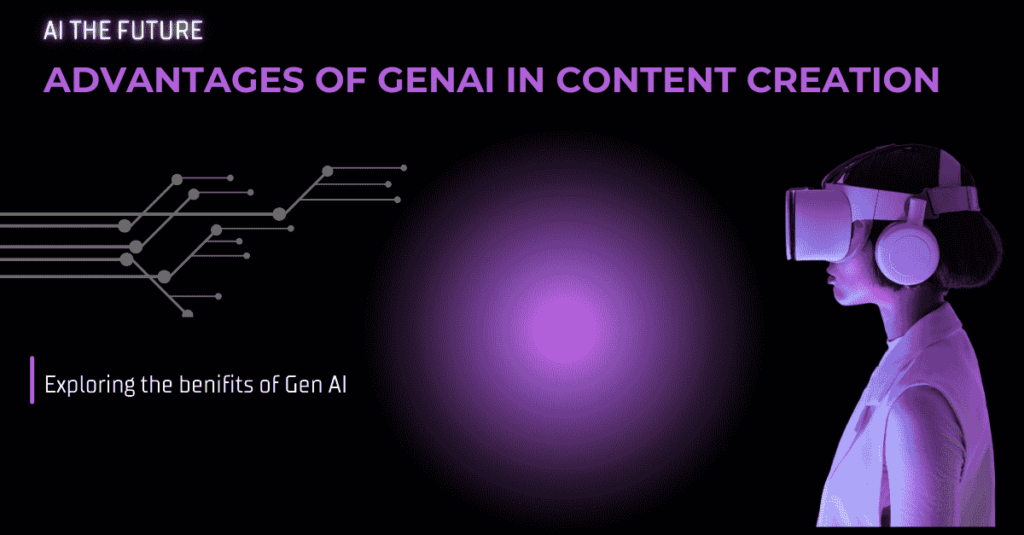
Table of Contents
Introduction
In the digital age, content creation is pivotal for effective communication, marketing, education, and entertainment. The demand for high-quality content has never been higher, necessitating innovative solutions to meet this need efficiently. Enter Generative AI, a groundbreaking technology revolutionizing content production. This article explores the primary advantage of using Generative AI in content creation, highlighting its efficiency, productivity, and the multitude of ways it is transforming the industry.
Understanding Generative AI
Generative AI is a subset of artificial intelligence capable of creating new content by learning patterns from existing data. Unlike traditional AI, which operates within predefined rules, Generative AI can produce unique and original pieces of content, including text, images, music, and videos. Technologies such as OpenAI’s GPT-4 exemplify this capability, creating coherent and contextually relevant content autonomously.
Primary Advantage of Using Generative AI in Content Creation
The Primary Advantage: Enhanced Efficiency and Productivity
The primary advantage of using Generative AI in content creation is its unparalleled efficiency and productivity. Here’s a detailed breakdown:
Accelerated Content Production:
- Speed: Generative AI can produce content rapidly. What might take a human hours to write can be generated by AI in mere seconds. This rapid production capability is invaluable for businesses that need to maintain a steady flow of fresh content.
- Volume: The ability to generate large volumes of content quickly allows businesses to scale their content strategies without proportional increases in manpower or cost.
Cost-Effectiveness:
- Reduction in Labor Costs: By automating the content creation process, businesses can reduce their reliance on human writers and designers, leading to significant cost savings. This is particularly beneficial for startups and small businesses operating with limited budgets.
- Resource Allocation: Savings on content creation costs allow companies to allocate resources to other critical areas such as marketing, customer service, and product development.
Consistency and Quality:
- Uniformity: Generative AI ensures consistency in tone, style, and quality across all content pieces. This is crucial for maintaining a cohesive brand voice and enhancing brand recognition.
- Error Reduction: Automated content generation reduces the likelihood of human errors such as typos, grammatical mistakes, and inconsistencies, thereby improving the overall quality of content.
Scalability:
- Adaptability to Demand: Generative AI allows businesses to easily scale their content production in response to market demands and trends. Whether it’s creating seasonal marketing campaigns or responding to current events, AI can quickly generate the necessary content.
- Global Reach: AI can generate content in multiple languages, making it easier for businesses to expand their reach and cater to diverse markets without the need for extensive translation services.
Personalization:
- Targeted Content: Generative AI can analyze user data to create personalized content tailored to specific audiences. This enhances user engagement and improves the effectiveness of marketing campaigns.
- Dynamic Updates: AI can generate content that adapts to changing user preferences and behaviors in real-time, ensuring that the content remains relevant and engaging.
Practical Applications of Generative AI in Content Creation
Generative AI is already being utilized in various sectors to streamline content creation:
Marketing and Advertising:
- Ad Copy: AI can generate engaging ad copy that resonates with target audiences, improving click-through rates and conversions.
- Email Campaigns: Personalized email content can be generated based on user behavior and preferences, enhancing engagement and response rates.
- Social Media: AI can create social media posts that maintain a consistent brand voice while being tailored to different platforms and audience segments.
E-commerce:
- Product Descriptions: AI can write unique and compelling product descriptions at scale, saving time and ensuring consistency across listings.
- Customer Reviews: Generative AI can analyze and summarize customer reviews, helping shoppers make informed decisions quickly.
- Personalized Recommendations: By analyzing user behavior, AI can generate personalized product recommendations, enhancing the shopping experience and driving sales.
Publishing:
- News Articles: AI can quickly generate news articles, allowing publishers to cover more stories and keep up with the fast-paced media landscape.
- Reports and Whitepapers: Detailed reports and whitepapers can be produced efficiently, providing valuable insights to readers.
- Educational Content: AI can create educational materials tailored to different learning styles and levels, enhancing the effectiveness of online education.
Entertainment:
- Scripts for Movies and TV Shows: AI can draft scripts, providing a creative foundation for human writers to build upon.
- Video Game Development: AI-generated dialogue and storyline elements can enhance the depth and complexity of video games.
- Music Composition: Generative AI can compose original music, offering new possibilities for artists and producers.
Customer Support:
- Chatbots and Virtual Assistants: AI can generate responses for customer inquiries, providing quick and accurate support.
- Knowledge Base Articles: AI can create and update knowledge base articles, ensuring customers have access to the latest information.
Case Studies
- The Washington Post: The news outlet uses an AI named Heliograf to write basic news reports, freeing up journalists to focus on in-depth stories and analysis.
- Alibaba: The e-commerce giant employs AI to create product descriptions, generating thousands of unique and engaging descriptions in minutes.
- Grammarly: This AI tool provides real-time writing assistance, helping users improve the quality and clarity of their content.
Do you know the the Responsibilities of Developers Using Generative AI in Ensuring Ethical Practices ?
Conclusion
The primary advantage of using Generative AI in content creation lies in its ability to significantly enhance efficiency and productivity. By automating the creation process, AI allows businesses to produce high-quality, consistent, and personalized content at scale, all while reducing costs and freeing up resources for other critical tasks. As Generative AI continues to evolve, its impact on content creation will only grow, offering even more opportunities for innovation and growth.
In a world where content is king, Generative AI is the game-changer that businesses need to stay ahead of the curve. If you are preparing for microservices interview then checkout here.

